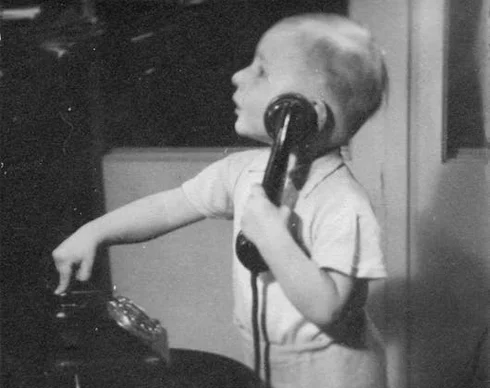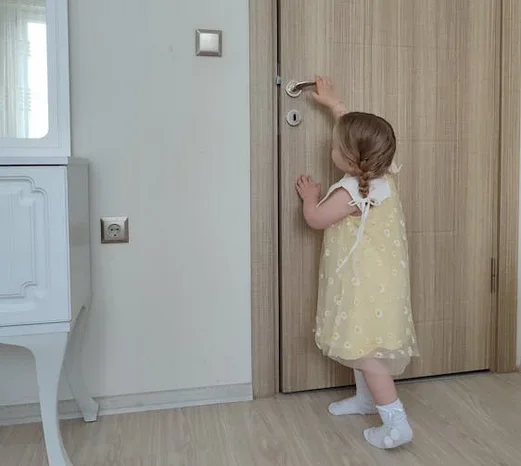Growing up in the 1960s meant living by an unspoken code that every kid understood instinctively. These weren’t rules posted on refrigerators or written in family handbooks—they were simply the way things were done, passed down through stern looks, raised eyebrows, and the occasional “because I said so.” Looking back, these household commandments shaped an entire generation and created a sense of order that somehow made perfect sense, even when we grumbled about it under our breath.
1. You Better Be Home When the Streetlights Come On

Summer evenings stretched endlessly when you were eight years old, but that magical freedom had one non-negotiable deadline. The moment those streetlights flickered to life, you knew it was time to drop whatever game you were playing and hightail it home. No exceptions, no negotiations, and certainly no stopping to pet Mrs. Henderson’s cat on the way.
Every parent in the neighborhood operated on this same system, creating an invisible network of accountability that kept track of every kid on the block. If you were spotted three streets over after dark, word would somehow beat you home, and you’d walk into a kitchen where Mom was already tapping her foot. The streetlight rule wasn’t just about safety—it was about respect, responsibility, and the understanding that home was where you belonged when day turned to night.
2. Children Are Seen and Not Heard When Adults Are Talking

When grown-ups gathered in the living room for their coffee and conversations, kids knew their place was on the periphery. You could sit quietly and absorb the adult world swirling around you, but speaking up or interrupting was social suicide. The art of being invisible while completely present was a skill every child mastered by necessity.
This rule taught patience and observation in ways that modern parenting books could never capture. You learned to read facial expressions, to understand the weight of pauses in conversation, and to pick up on the subtle undercurrents that adults thought they were hiding. Sure, it felt restrictive at the time, but it also gave you a front-row seat to understanding how the adult world really worked.
3. Ask Permission Before Using the Phone

The family telephone—that heavy black rotary beast mounted on the kitchen wall—was not a toy or a personal communication device. Every call required advance approval, and long conversations were a luxury reserved for emergencies or very special occasions. You stated your business, made your request, and hoped Mom wasn’t expecting an important call from Aunt Ruth.
Phone time was precious currency in a household where one line served everyone’s needs. Dad might be expecting a call about work, Mom needed to coordinate carpools, and heaven help you if you tied up the line when someone was trying to reach the family in an actual emergency. Learning to be concise, respectful, and mindful of others’ needs was just part of growing up in the pre-cell phone era.
4. Finish Everything on Your Plate

Wasting food wasn’t just frowned upon—it was practically a moral failing that invoked references to starving children around the world. Every grain of rice, every green bean, and yes, even those Brussels sprouts had to disappear before you could leave the table. “There are children in Africa who would be grateful for that meal” became the rallying cry of dinner tables across America.
This rule came from parents who remembered the Great Depression or had lived through wartime rationing, making every morsel precious. The clean plate policy taught appreciation for abundance, respect for the effort that went into preparing meals, and the discipline to finish what you started. Looking back, it also probably contributed to lifelong struggles with portion control, but the intention was pure—waste not, want not.
5. Sunday Clothes Stay Clean Until After Church

Your Sunday best wasn’t just clothing—it was armor for facing the Lord and the judgmental eyes of Mrs. Patterson in the front pew. From the moment you got dressed until you walked back through the front door after service, maintaining that pristine appearance was your sacred duty. Grass stains, scuff marks, or heaven forbid, actual tears in the fabric were catastrophes of biblical proportions.
The ritual of Sunday dressing taught reverence, self-control, and the importance of presenting your best self to the world. You learned to sit carefully, walk purposefully, and resist every childhood impulse to climb, run, or explore. It was a weekly lesson in delayed gratification—endure the discomfort and restriction now, and you’d be free to be a regular kid again once you changed into your play clothes.
6. Chores Come Before Fun

Saturday morning cartoons might be calling your name, but the dishes, garbage, and yard work had first dibs on your time. Fun was earned, not given, and every family had their own system of ensuring work preceded play. Whether it was making your bed before breakfast or finishing your paper route before friends came calling, responsibility always came first.
This rule created a work ethic that would serve you well throughout life, though it felt like cruel and unusual punishment when Bugs Bunny was waiting on the other side of a pile of dirty dishes. You learned that satisfaction was sweeter when it was earned, that teamwork made household management possible, and that contributing to the family wasn’t optional—it was your civic duty as a member of the household.
7. Don’t Go Swimming for at Least an Hour After Eating

Every parent in America was convinced that food and water were a deadly combination, and no amount of pleading could override the sacred one-hour waiting period. Pool parties came to a screeching halt after lunch, and beach days were carefully timed around meal schedules. The threat of mysterious cramps that would surely lead to drowning was enough to keep even the most water-loving kids on dry land.
Medical science has since debunked this fear, but in the ’60s, it was gospel truth defended by mothers everywhere. The enforced break actually served multiple purposes—it gave parents a chance to relax, helped food settle, and taught kids that good things come to those who wait. Those poolside hours spent playing cards or reading comic books while watching the water longingly became some of the most treasured memories of summer.
8. Boys and Girls Play Separately After a Certain Age

Once you hit double digits, invisible lines were drawn that separated the boys from the girls during neighborhood games and school activities. Mixed groups were fine for family gatherings or organized activities, but free play naturally segregated along gender lines. This wasn’t necessarily enforced by parents—it just happened, guided by social expectations and budding self-consciousness.
The separation created safe spaces for both groups to navigate the awkwardness of growing up without the added complexity of impressing the opposite gender. Boys could be boys without worrying about appearing tough or cool, and girls could develop friendships without the drama that mixed groups often brought. While limiting in some ways, it also allowed for deep, uncomplicated friendships that lasted well into adulthood.
9. Say “Yes Sir” and “Yes Ma’am” to Adults

Respect for elders wasn’t just encouraged—it was demanded, and the failure to use proper titles when addressing adults was a quick way to find yourself in hot water. Every teacher, neighbor, relative, and family friend deserved the courtesy of formal address. “Yeah” or “okay” might fly with your buddies, but adults required the respect of proper language.
This rule created a clear hierarchy that everyone understood and operated within, though it sometimes felt stifling to young spirits eager to assert their independence. The formal language taught patience, humility, and the understanding that respect was something you gave freely, not something that had to be earned. It also made those rare moments when an adult invited you to use their first name feel like a genuine rite of passage.
10. No Hats at the Dinner Table

Headwear of any kind—baseball caps, knit hats, or even hair scarves—had to come off the moment you sat down for a meal. This rule applied to both boys and girls and extended to any meal eaten at home, whether it was a quick breakfast or Sunday dinner. Keeping your hat on showed disrespect to the food, the family, and the sanctity of the dinner table.
The hat rule was about more than just etiquette—it was about transformation and intentionality. Removing your hat marked the transition from outdoor play to indoor family time, from individual activity to communal gathering. It was a small ritual that signaled respect for the meal, appreciation for those who prepared it, and recognition that mealtime was sacred family time deserving of your full presence and attention.
11. Don’t Slam Doors or You’ll Wake the Baby

Whether there was actually a baby in the house or not, slamming doors was treated as a cardinal sin that disrupted the peace and harmony of the home. Every entrance and exit required careful attention to the door handle, gentle pressure, and mindful closing. The sound of a slammed door could bring a parent running from three rooms away, ready to deliver a lecture about consideration and self-control.
This rule taught spatial awareness, emotional regulation, and consideration for others in ways that extended far beyond door management. Learning to control your physical actions when you were angry, excited, or in a hurry was a valuable life skill disguised as a simple household rule. It also created homes that felt more peaceful and controlled, where even the youngest family members understood that their actions affected everyone around them.
12. Television Stays Off During Dinner

The dinner table was sacred ground where families gathered to share food, conversation, and the events of their day. The television—even if it was broadcasting your favorite show—was not invited to this daily ritual. Meals were for talking, listening, and connecting with the people who mattered most, and the distraction of the TV would have been considered almost sacrilegious.
This media-free zone created opportunities for real conversation that many families today struggle to maintain. Without the electronic babysitter demanding attention, parents and children actually talked to each other, shared stories from school and work, and maintained the kind of daily connection that built strong family bonds. The dinner hour became a reliable touchstone in busy lives, a daily reminder that family came first, always and without exception.
Looking back on these unspoken rules of ’60s household life, it’s easy to see how they shaped an entire generation’s understanding of respect, responsibility, and family values. While some may seem overly strict by today’s standards, they created structure and security in a rapidly changing world. These invisible guidelines taught us that home was a place of order and love, where everyone had a role to play and everyone’s wellbeing mattered. Perhaps most importantly, they showed us that the best rules weren’t the ones written down and posted on walls—they were the ones we carried in our hearts.
This story 12 House Rules in the ’60s That Everyone Knew Without Needing to Be Told was first published on Takes Me Back.


